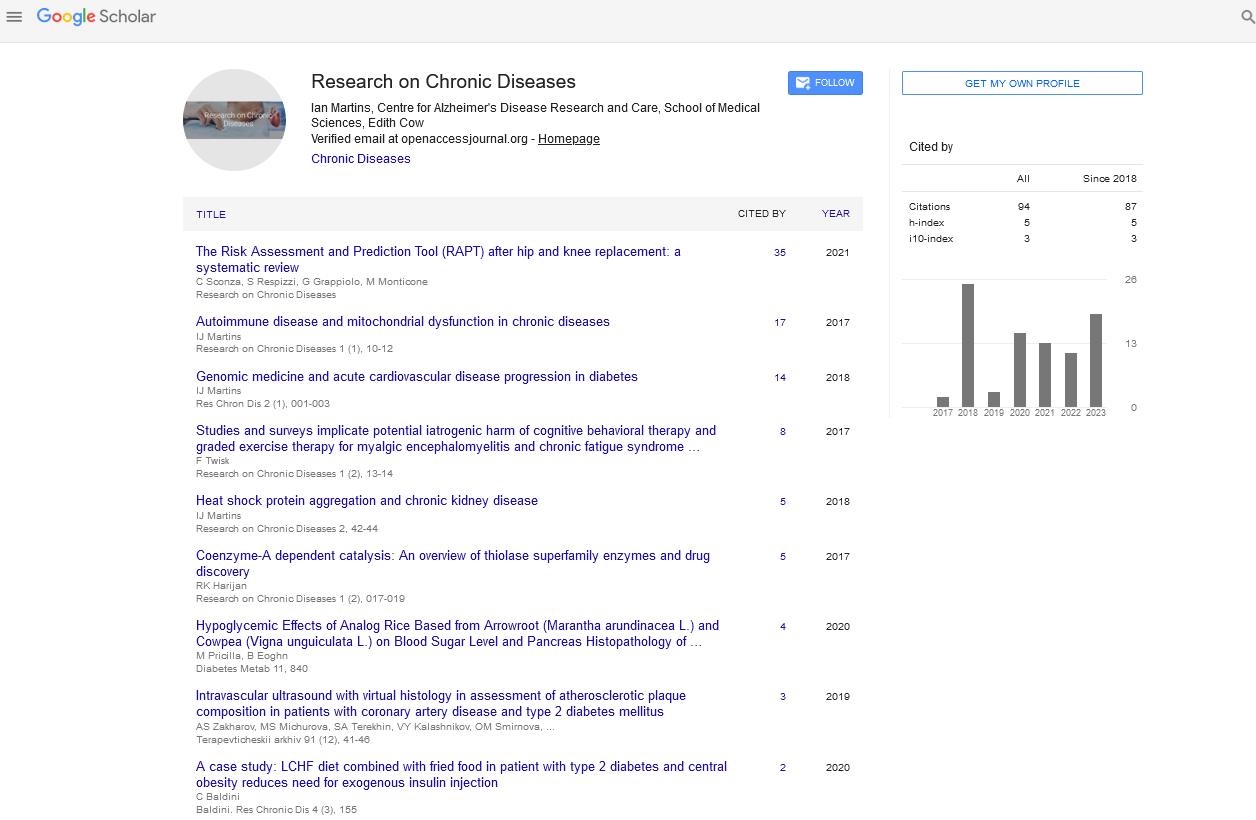Perspective - Research on Chronic Diseases (2024) Volume 8, Issue 1
Navigating the Complexity of Autoimmune Diseases: Unraveling the Mysteries and Charting Paths to Understanding and Management
- Corresponding Author:
- Yuo-Hsien Shiau
Department of Pathology, Taipei Medical University Hospital, Taipei, Taiwan
E-mail: shi31@nccu.gmail.com
Received: 04-Jan-2024, Manuscript No. OARCD-24-124708; Editor assigned: 08-Jan-2024, PreQC No. OARCD-24-124708 (PQ); Reviewed: 22-Jan-2024, QC No. OARCD-24-124708; Revised: 29-Jan-2024, Manuscript No. OARCD-24-124708 (R); Published: 07-Feb-2024, DOI: 10.37532/OARCD.2024.8(1).151-152
Introduction
Within the intricate tapestry of the human immune system lies a phenomenon that both baffles and challenges medical science autoimmune diseases. These conditions occur when the immune system, designed to protect the body from external threats, turns its destructive gaze inward, attacking its own tissues and organs. This diverse group of disorders spans a spectrum of manifestations, affecting millions worldwide. In this comprehensive exploration, we delve into the intricate world of autoimmune diseases, unraveling their underlying mechanisms, exploring common types, examining risk factors and investigating the latest strides in research and management strategies.
Description
Common types of autoimmune diseases
Rheumatoid Arthritis (RA): An autoimmune disorder that primarily affects the joints, leading to inflammation, pain and joint damage.
Systemic Lupus Erythematosus (SLE): A systemic autoimmune disease that can affect multiple organs, including the skin, joints, kidneys and cardiovascular system.
Type 1 diabetes: An autoimmune condition in which the immune system targets and destroys insulin-producing cells in the pancreas, leading to insulin deficiency.
Multiple Sclerosis (MS): An autoimmune disease characterized by the immune system attacking the protective covering of nerve fibers in the central nervous system, leading to neurological symptoms.
Hashimoto’s thyroiditis: An autoimmune disorder in which the immune system attacks the thyroid gland, resulting in hypothyroidism.
Celiac disease: An autoimmune condition triggered by the consumption of gluten, causing damage to the small intestine and impairing nutrient absorption.
Psoriasis: A chronic skin condition characterized by the immune system causing rapid skin cell turnover, leading to the development of thick, red and scaly patches.
Risk factors for autoimmune diseases
Genetic predisposition: Family history of autoimmune diseases increases the likelihood of an individual developing similar conditions. Certain genes associated with immune system function may contribute to genetic susceptibility.
Gender: Autoimmune diseases disproportionately affect women, with many conditions showing a higher prevalence in females. Hormonal factors, particularly estrogen, may play a role in this gender bias.
Environmental exposures: Exposure to environmental factors such as infections, pollutants, and certain chemicals may trigger or exacerbate autoimmune responses. Viral infections, in particular, have been linked to the development of autoimmune diseases.
Hormonal changes: Hormonal fluctuations, especially during puberty, pregnancy, and menopause, can influence the risk of developing autoimmune diseases. Estrogen, in particular, is believed to play a role in modulating immune responses.
Age: The onset of autoimmune diseases can occur at any age, but certain conditions may have a predilection for specific age groups. For example, rheumatoid arthritis often manifests in middle age, while type 1 diabetes is more common in children and young adults.
Race and ethnicity: Some autoimmune diseases exhibit variations in prevalence among different racial and ethnic groups. For instance, lupus is more common among individuals of African, Asian and Native American descent.
Immunosuppressive medications
Corticosteroids: These anti-inflammatory drugs are commonly used to reduce inflammation and suppress the immune system. However, long term use may be associated with side effects.
Disease Modifying Anti-Rheumatic Drugs (DMARDs): These medications aim to modify the underlying disease process and prevent joint damage in conditions such as rheumatoid arthritis.
Biologics: Biologic drugs target specific components of the immune system involved in autoimmune responses. They are often used in conditions like rheumatoid arthritis, psoriasis and inflammatory bowel disease.
Research and innovations in autoimmune diseases
The landscape of autoimmune disease research is dynamic, with ongoing efforts to deepen our understanding of these conditions and develop innovative approaches to treatment. Key areas of research and innovation include:
Precision medicine: Advances in genomics and molecular biology are paving the way for personalized treatment approaches. Precision medicine aims to tailor therapies based on an individual’s genetic makeup and the specific characteristics of their autoimmune disease.
Biomarkers for early diagnosis: Identifying reliable biomarkers for early diagnosis and monitoring disease activity is a crucial aspect of autoimmune disease research. Biomarkers can guide treatment decisions and help predict disease progression.
Immunotherapy: Immunotherapy approaches, including the use of immune-modulating drugs and biologics, are at the forefront of autoimmune disease research. These therapies aim to recalibrate the immune system and restore balance.
Neuroimmune interactions: Understanding the intricate connections between the immune system and the nervous system is a focus of research, particularly in autoimmune conditions that impact both systems, such as multiple sclerosis.
Conclusion
Autoimmune diseases present a multifaceted challenge to individuals, healthcare providers and researchers alike. The journey of unraveling the mysteries of these conditions involves a collaborative effort that spans basic science, clinical care, and patient advocacy. While effective cures remain elusive, ongoing research and innovative approaches to management offer hope for improved outcomes and a better quality of life for those affected by autoimmune diseases.
